May 16, 2025 | 01:46 GMT +7
May 16, 2025 | 01:46 GMT +7
Hotline: 0913.378.918
May 16, 2025 | 01:46 GMT +7
Hotline: 0913.378.918
Mr. Nguyen Minh Tin, Deputy Director-general of GC Food Group shared that the business has focused on the rejuvenation of aloe vera cultivars using tissue culture technology. The group is making efforts to research and establish procedures to later transfer the technology to the Department of Science and Technology in Ninh Thuan Province. This will facilitate the technology transfer to local farmers under rural and mountainous development programs.
According to Mr. Tin's assessment, the current situation of aloe vera suffering from rot in Ninh Thuan province is very concerning. However, through the tissue culture technology known as Invitro that the GC Food Group is implementing, all disease pathogens will be eliminated, resulting in new seedlings with high productivity. This technology is referred to as rejuvenating aloe vera cultivars.
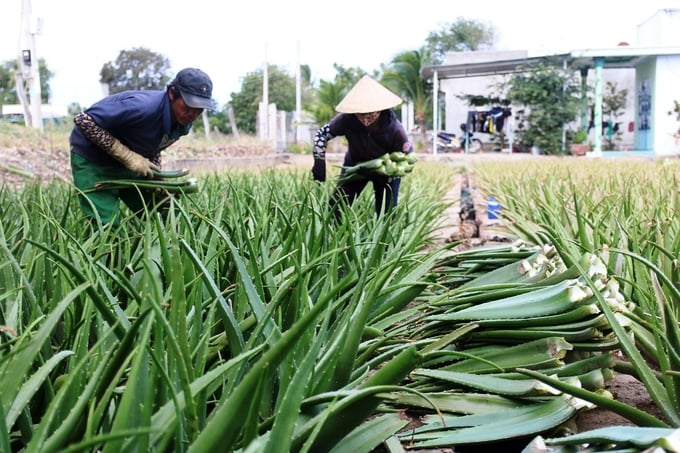
Currently, people's aloe vera varieties often rot, so they need to be replaced with tissue culture varieties. Photo: M.P.
Currently, people's aloe vera varieties often rot, so they need to be replaced with tissue culture varieties. Photo: M.P."Advanced agricultural countries such as Thailand, India, and Israel highly value this technology, but Vietnam has not widely applied it. GC Food Group is pioneering its implementation," shared Mr. Nguyen Minh Tin.
Also, according to Mr. Tin, GC Food Group currently owns a tissue culture nursery with an area of about 200m2, with a capacity of around 250,000 - 300,000 plants per month, yielding about 3 - 3.6 million plants per year. Currently, there are about 105 hectares of aloe vera in Ninh Thuan, severely lacking raw materials for deep processing factories of aloe vera products.
"At present, GC Food Group's aloe vera product processing factory has to reject some orders due to insufficient leaves for production. The raw material source is vital for the survival of processing factories. Therefore, GC Food Group is proposing a planning policy for about 200 hectares in Phuoc Vinh to link and expand the raw material area," Mr. Nguyen Minh Tin informed.
Aloe vera is considered a "longevity" crop, taking about 6 - 8 months from planting to leaf harvest. With proper care, the harvesting cycle of aloe vera can extend up to 10 years. When aloe vera plants reach 6 months of age, with good care, they can yield from 6 - 8 tons of leaves per hectare per month, harvesting hundreds of tons of leaves annually. Currently, the average productivity of aloe vera in Ninh Thuan is about 4 tons per hectare per month.
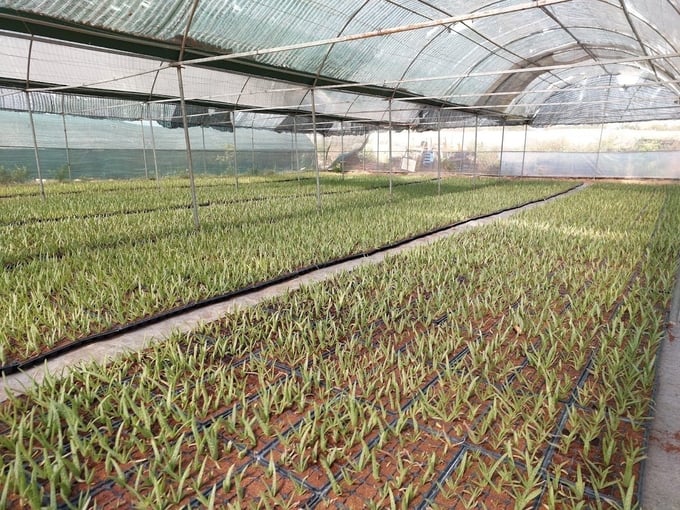
Garden of aloe vera plants. Photo: M.P.
According to Dr. Phan Cong Kien, Deputy Director of the Institute for Cotton Research and Agricultural Development in Nha Ho (Nha Ho Institute), the Institute has completed the documentation to request the relevant authorities to grant protection certificates for 4 grape varieties NH01-152, NH02-37, NH02-97, and NH04-102. In addition, the Nha Ho Institute also has 2 grape varieties that have been accepted for protection certificates, namely NH01-16 and NH01-26, with documentation still being finalized.
Dr. Kien also mentioned that the Nha Ho Institute currently preserves 245 grape germplasms, many of which are promising varieties selected from vineyards such as NH01-16, NH01-26, NH02-37, NH04-61, NH04-102, NH04-128, NH02-137, NH01-195, which are being tested, compared, and trialed before large-scale production. Additionally, the Institute is conducting breeding work focusing on disease resistance, fruit size, and quality.
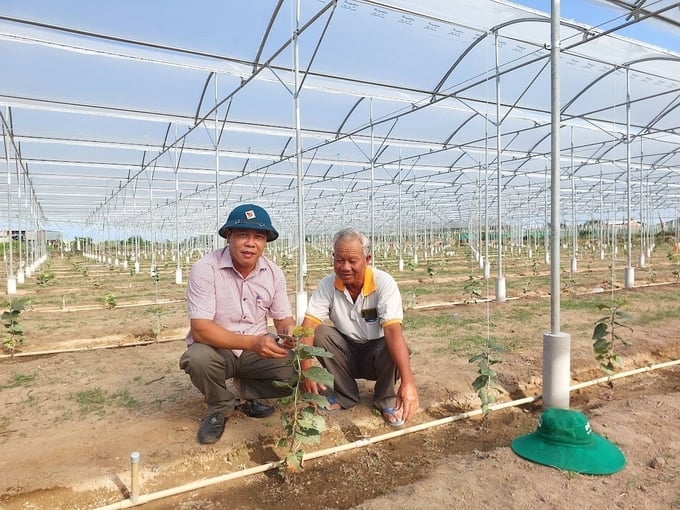
The model of growing grapes in greenhouses of Thai An Grape Cooperative was transferred technology by the Nha Ho Institute of Cotton Research and Rural Development. Photo: M.P.
"The Nha Ho Institute has developed a high-tech grape production process, growing grapes in greenhouses with polycarbonate roofs to protect against rain, using Y-shaped trellises; fertilizing and watering with efficient irrigation systems; automatic climate and rain shelter control with mobile rainproof roofs, shading nets, ventilation fans, and misting systems," said Dr. Phan Cong Kien.
According to Mr. Dang Kim Cuong, Director of the Department of Agriculture and Rural Development of Ninh Thuan province, besides the NH01-152 grape variety which has been included in the province's crop structure and is recommended for expansion, the Ninh Thuan authorities are also focusing on developing new high-quality grape varieties to contribute to the agricultural restructuring goals.
"Currently, the Department of Agriculture and Rural Development of Ninh Thuan province is collaborating with the Nha Ho Institute and related units to select new grape varieties for trial planting, evaluating their adaptability for further expansion," Mr. Dang Kim Cuong stated.
According to Mr. Nguyen Khac Phong, Director of Thaian Grape Cooperative, the greenhouse for grape cultivation is solidly constructed with iron frames, covered with polycarbonate sheets, and surrounded by insect-proof nets. To ensure optimal efficiency for grapes grown in greenhouses, growers invest in low-pressure misting irrigation systems to save labor costs.
"Growing grapes in greenhouses will minimize the impact of weather conditions. This helps grapevines grow well, with fewer pests and diseases, resulting in higher economic efficiency compared to traditional methods. Grapes are protected in a closed environment, so they are very safe, and common diseases caused by insects, nighttime dew... are almost negligible. Especially, grapes grown in greenhouses no longer face the 'nightmare' of rain during ripening as they used to. Because grapes grown outdoors when ripe are all spoiled by rain, with ripe grapes seeming to dissolve in the rain," Mr. Nguyen Khac Phong, Director of Thaian Grape Cooperative, emphasized.
Translated by Linh Linh

(VAN) Use of high-quality broodstock and biotechnology is regarded as the most effective approach to ensuring sustainable and economically viable shrimp aquaculture ahead of climate change and the emergence of increasingly intricate disease patterns.

(VAN) Carbon farming is a form of agricultural practices that helps absorb more greenhouse gases than it emits, through smart management of soil, crops, and livestock.

(VAN) This is a key content of the Memorandum of Understanding recently signed between the Vietnam Fisheries Society and Kunihiro Inc of Japan.

(VAN) To achieve the goal, local authorities and businesses in Kon Tum province have fully prepared the necessary conditions for the new Ngoc Linh ginseng planting season.
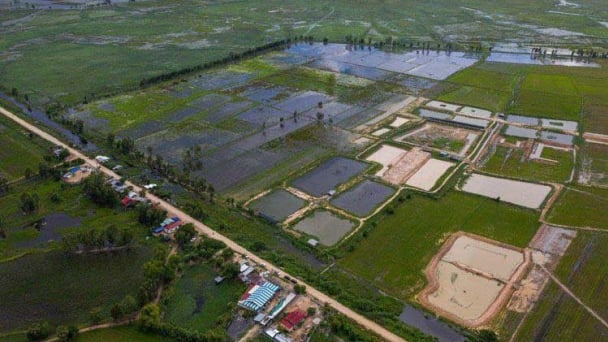
(VAN) Jiangsu province is gearing up to host training programs in Phnom Penh, the capital of Cambodia, this year to establish the Fish and Rice Corridor.
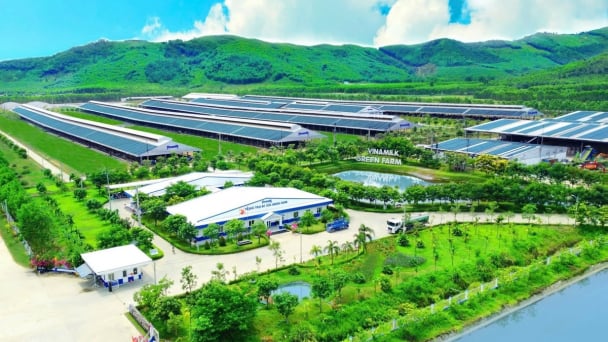
(VAN) Le Hoang Minh, representing Vinamilk, shared the company's experience in energy saving and green energy transition for production at a workshop held during the P4G Summit.
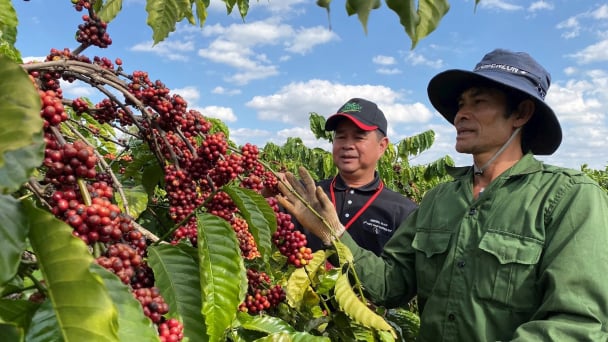
(VAN) Businesses emphasize fairness and equality when integrating social factors into their sustainable development strategies.